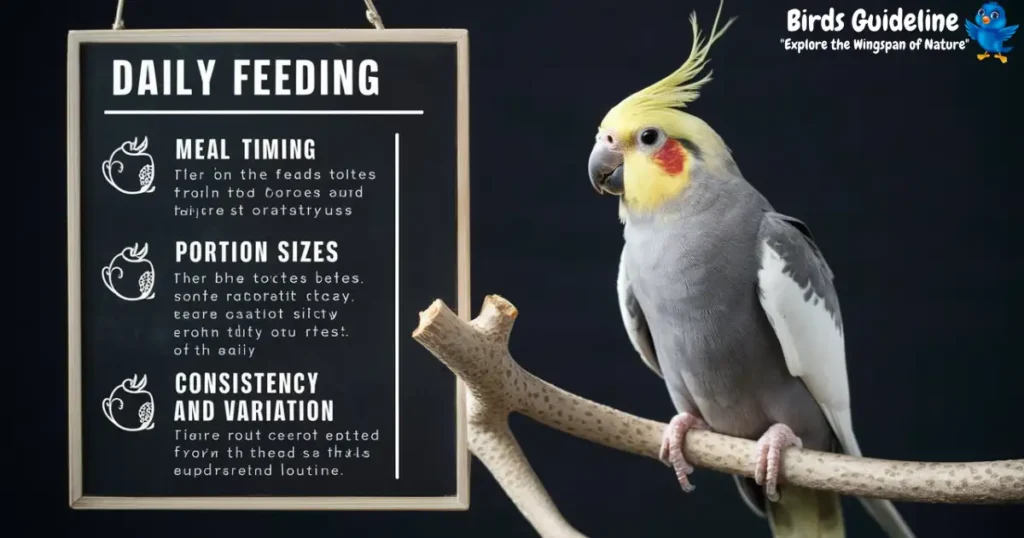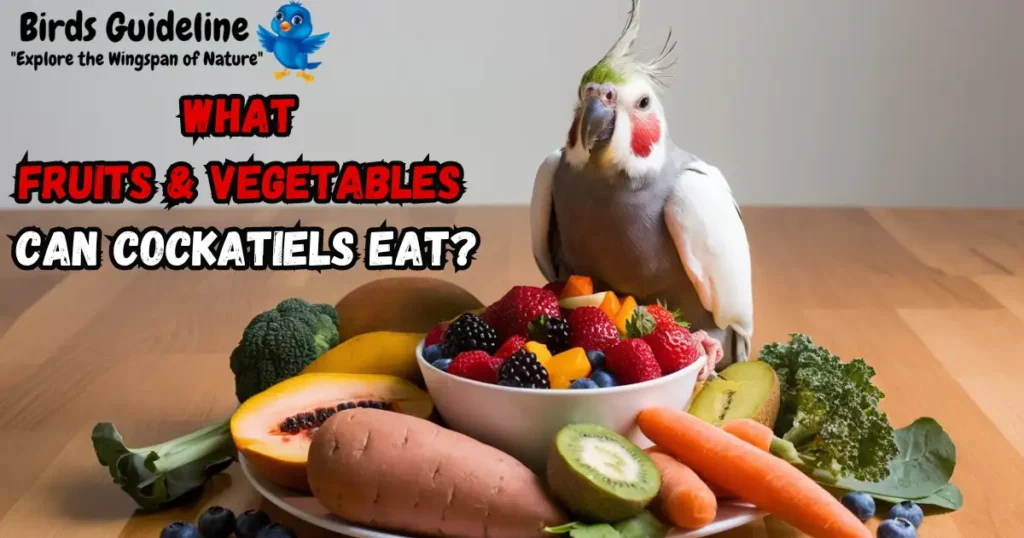Cockatiels can eat cheese, but only in small, infrequent amounts. Cheese should be considered more of a treat rather than a staple in their diet.
Cockatiels, with their playful demeanor and captivating whistles, have won the hearts of many as charming companions. These small parrots require a balanced diet to maintain their health and vitality, which primarily consists of seeds, fruits, and vegetables. Introducing a variety of foods can guarantee they receive essential nutrients, yet not all human foods are safe for them.
Cheese, in moderation, can be a tasty snack for your feathered friend, but it’s crucial to understand the implications and guidelines of feeding cheese to cockatiels. This approach to their diet helps prevent nutritional deficiencies and supports their overall well-being, making every meal an opportunity for both nourishment and enjoyment.
Nutritional Needs
Feeding cockatiels a balanced diet is crucial for their health and wellbeing. Owners often wonder if they can share human foods like cheese with their feathered friends. Understanding the nutritional needs of cockatiels is essential before introducing new foods to their diet. This section dives into what nutrients are vital for cockatiels and how cheese might fit into their dietary balance.
Essential Nutrients
Cockatiels require a variety of nutrients to stay healthy. These include:
- Proteins: For feather growth and body repairs.
- Fats: To provide energy and help absorb vitamins.
- Vitamins: Such as A, D, E, and K for overall health.
- Minerals: Like calcium for strong bones and beak.
When considering cheese as a treat, it’s important to note its components:
| Nutrient | Benefit | Concern |
|---|---|---|
| Protein | Supports growth | Excess can strain kidneys |
| Fat | Provides energy | Can lead to obesity |
| Calcium | Strengthens bones | Imbalance affects metabolism |
| Sodium | Maintains fluid balance | High levels are toxic |
Cheese contains proteins and fats that can benefit cockatiels in small amounts. However, its high sodium and lactose content may pose risks. Cockatiels lack the enzymes needed to properly digest lactose, which could lead to digestive issues. Therefore, cheese should be given sparingly, if at all, and only as an occasional treat.
Dietary Balance
A balanced diet for cockatiels consists mostly of:
- Seeds: A mix that’s formulated for cockatiels.
- Pellets: Provide a balanced range of nutrients.
- Fresh fruits and vegetables: Offer vitamins and hydration.
Introducing cheese into a cockatiel’s diet must be done with care:
- Offer tiny pieces as a rare treat.
- Monitor for any signs of digestive upset.
- Make sure it does not replace key elements of their main diet.
Balance is key. Cockatiels thrive on a diet that meets their nutritional needs without excess. Here’s a simple guideline for a well-rounded cockatiel diet:
| Food Type | Percentage |
|---|---|
| Seeds and Pellets | 75-80% |
| Fresh Produce | 20-25% |
| Treats (like cheese) | <5% |
Sticking to this guideline helps your cockatiel gets the right mix of nutrients. Be cautious with cheese due to potential health risks. Always prioritize a diverse diet that mimics what they would eat in the wild.
Cheese Varieties
Cockatiels enjoy a variety of treats, and as pet owners, we often wonder about sharing our favorite snacks with them. Cheese comes in many varieties, from soft and creamy to hard and aged. It’s a common human food, but is it safe for cockatiels? Let’s step into the world of cheese and discover which types can be safe for our feathered friends.
Types Of Cheese And Their Safety
When considering cheese for cockatiels, it’s essential to understand the different types and their potential effects on avian health. Cheese is mainly categorized by texture and flavor, ranging from mild to strong. Here’s a brief overview:
- Mild Cheeses: These include mozzarella and ricotta. They are lower in salt and additives, which may make them slightly safer options for cockatiels in very small amounts.
- Aged Cheeses: Cheddar, parmesan, and gouda fall under this category. They are higher in sodium and can be harder for cockatiels to digest.
- Soft Cheeses: Brie and camembert have bold flavors and creamy textures. However, their high fat content makes them unsuitable for cockatiels.
- Blue Cheeses: These have distinct veins of mold and a strong taste. They are a definite no for cockatiels due to the presence of mold.
Considering the lactose content and the presence of fats and salts, cheese can pose health risks to cockatiels. Lactose intolerance is common in birds, and consuming cheese could lead to digestive issues. Additionally, the high fat and salt content in cheese is not ideal for a cockatiel’s diet. Thus, while some cheeses are less harmful than others, it’s best to avoid making cheese a regular part of their diet.
Safe Options
Seeking Alternatives to Cheese is a smart choice for cockatiel owners. There are plenty of safe and healthy options that can satisfy your bird’s taste buds without the risks associated with cheese. Here are some suitable alternatives:
- Fresh Fruits: Apples, bananas, and berries offer natural sweetness and essential nutrients.
- Vegetables: Leafy greens, carrots, and peas are excellent for a cockatiel’s health.
- Cooked Grains: Brown rice, quinoa, and cooked pasta can be occasional treats.
- Seeds and Nuts: In moderation, these can provide healthy fats and proteins.
Always introduce new foods gradually and observe your cockatiel for any adverse reactions. It’s important to remember that treats should not make up more than 10% of a cockatiel’s diet. The mainstay should always be a high-quality, formulated pellet diet supplemented with fresh foods. Always consult with a veterinarian before making significant changes to your cockatiel’s diet. By choosing safe options and providing a balanced diet, you help maintain a happy, healthy life for your feathered companion.
Potential Risks
Many pet owners wonder if their feathered friends can enjoy the same treats they do, including cheese. While cockatiels might peck at cheese if offered, it’s crucial to understand the potential risks involved. Let’s dive into why cheese is not safe for cockatiels, focusing on lactose intolerance and high fat concerns.
Lactose Intolerance
Cockatiels and other birds cannot digest lactose, a sugar found in dairy products like cheese. This intolerance can lead to multiple digestive issues. Here are key points to consider:
- Digestive Stress: Lactose can cause stomach upset in cockatiels.
- Uncomfortable Symptoms: Birds might experience symptoms like diarrhea.
Understanding the nature of lactose intolerance in cockatiels is vital. The table below outlines the potential digestive issues caused by lactose in cheese:
| Symptom | Impact on Cockatiel |
|---|---|
| Diarrhea | Dehydration, discomfort |
| Stomach Upset | Reduced appetite, stress |
Feeding cheese to cockatiels introduces risks of feeding cheese to cockatiels, primarily due to their inability to process lactose efficiently.
High Fat Concerns
Cheese is also high in fat, which poses another set of risks for cockatiels. A high-fat diet is unhealthy for these birds, leading to several issues:
- Weight Gain: Excess fat can make cockatiels overweight.
- Heart Problems: Too much fat is bad for their hearts.
Considering the high fat concerns associated with feeding cheese to cockatiels is essential. The table below highlights the negative impacts of a high-fat diet:
| Issue | Effect on Cockatiel |
|---|---|
| Obesity | Less activity, health risks |
| Heart Disease | Potential for reduced lifespan |
The risks of feeding cheese to cockatiels, especially concerning high fat, are clear. It’s best to avoid such treats to keep your cockatiel healthy and happy.
Signs Of Allergies
Many pet owners enjoy sharing their food with feathered friends, but not all human foods are safe for cockatiels. Take cheese, for instance. While a tiny bit may not harm them, cockatiels can show signs of allergies or intolerance. It’s crucial to recognize these signs early to keep your pet healthy and happy.
Symptoms To Watch
Just like humans, cockatiels can exhibit clear symptoms when they eat something they shouldn’t. Noticing these signs can be the difference between a healthy bird and an emergency visit to the vet. Keep an eye out for:
- Respiratory Issues: Wheezing or difficulty breathing can occur.
- Feather Problems: Missing feathers or changes in their condition might be a sign.
- Behavioral Changes: Look for signs like lethargy or aggression.
- Digestive Upset: This includes vomiting or changes in droppings.
These symptoms are not exclusive to cheese allergies and can indicate other health issues. Monitor your cockatiel closely if they’ve consumed cheese and show any of the above signs. Here’s a quick reference table:
| Symptom | Possible Cause | Action |
|---|---|---|
| Respiratory Issues | Allergic Reaction | Remove allergens, provide fresh air |
| Feather Problems | Allergy or Parasites | Check for pests, consult vet |
| Behavioral Changes | Discomfort or Pain | Observe, separate from stressors |
| Digestive Upset | Intolerance or Poisoning | Maintain a clean diet, vet visit |
When To Consult A Vet
Identifying when your cockatiel needs professional help is essential. If you notice any of the symptoms listed above, it’s time to act. Here are some situations that require a vet’s attention:
- Persistent Symptoms: Issues lasting more than 24 hours need a vet’s care.
- Multiple Symptoms: If your bird shows several allergy signs at once.
- Severe Reactions: Immediate vet consultation is vital for severe symptoms.
- Dietary Concerns: If you’re unsure about your cockatiel’s diet, get expert advice.
If you’re in doubt, it’s always safer to reach out to a professional. A vet can provide the right guidance and treatment to help your cockatiel recover. Remember, it’s better to be cautious than to risk your bird’s well-being. Note these points for when to consult a vet:
| Condition | Recommended Action |
|---|---|
| Continued Distress | Book an immediate vet appointment |
| Sudden Severe Symptoms | Seek emergency vet care |
| Unclear Causes | Consult vet for allergy testing |
| Preventative Care | Schedule regular check-ups |
Frequently Asked Questions
Cheese is not ideal for cockatiels as it can be difficult for them to digest due to its lactose content. Offer it sparingly if at all.
Birds can eat small amounts of cheese occasionally. It’s not toxic, but should be a rare treat due to lactose content.
Cockatiels should not eat dairy products as they lack the enzyme lactase to properly digest lactose. This can lead to digestive issues.
Conclusion
Feeding cockatiels cheese should be done with caution. It’s not a natural part of their diet and can lead to health issues if overdone. Opt for occasional, tiny amounts as a treat. Always prioritize their specific dietary needs for optimal health and happiness.
Remember, moderation is key for a healthy cockatiel.


